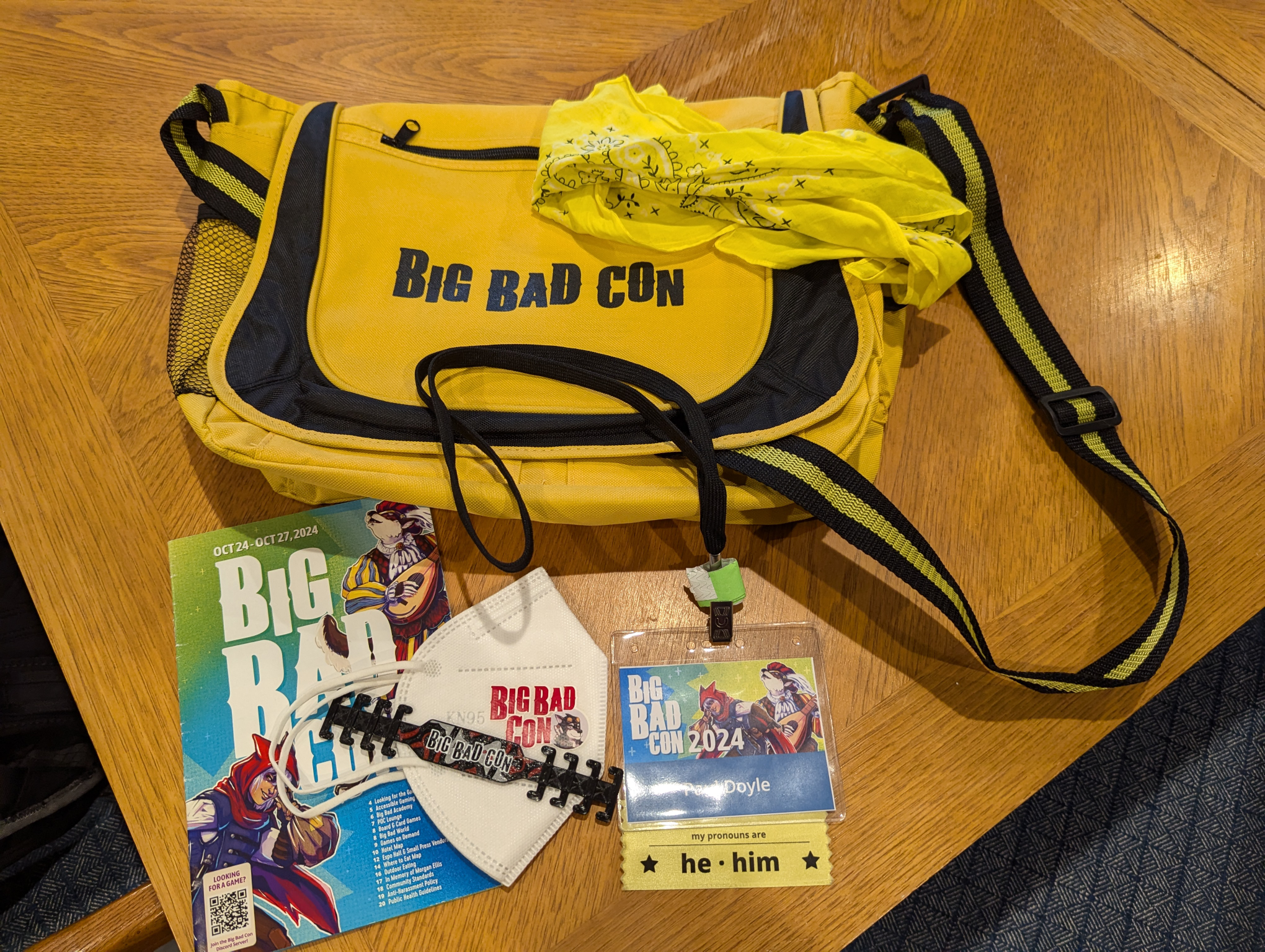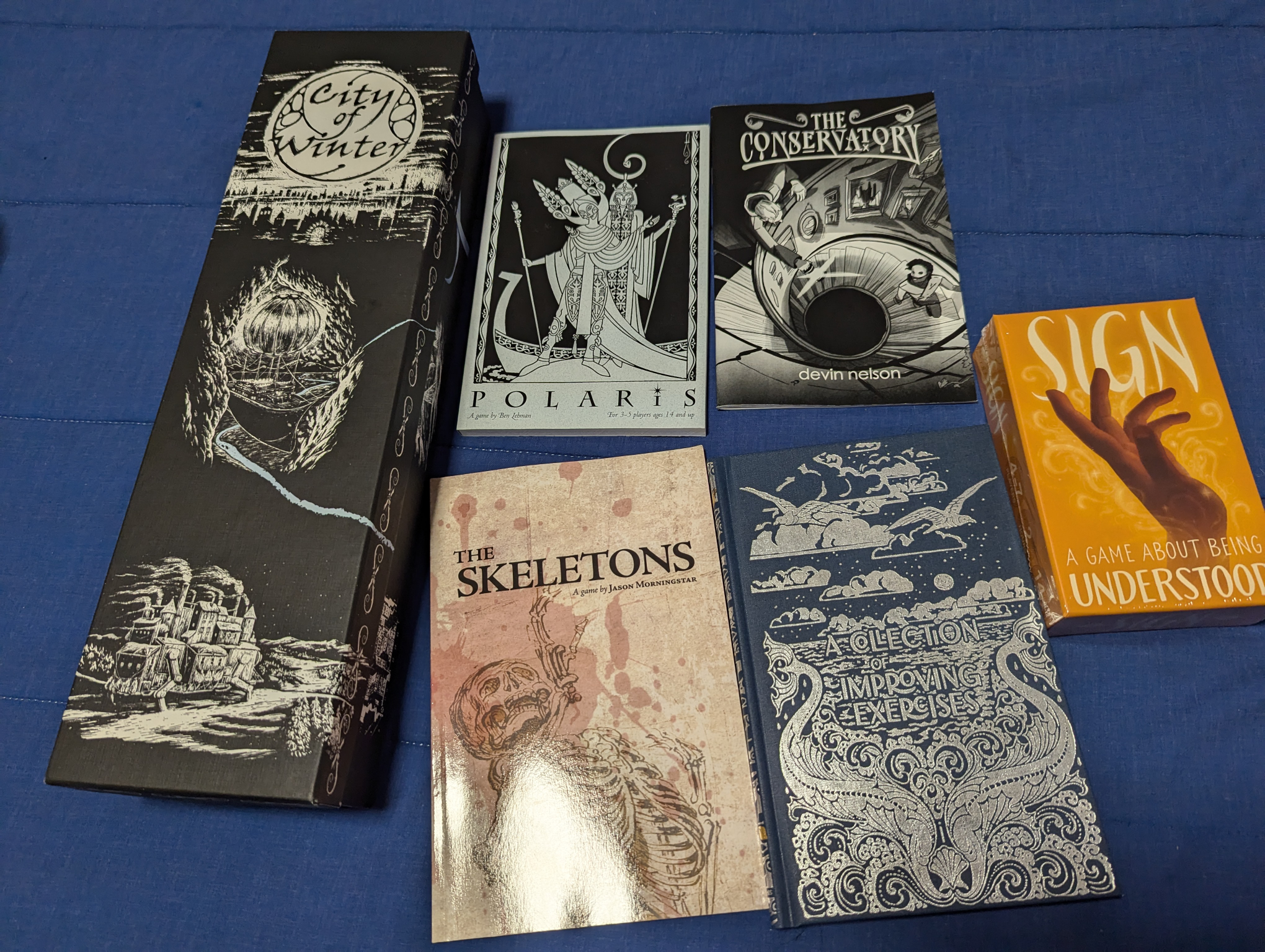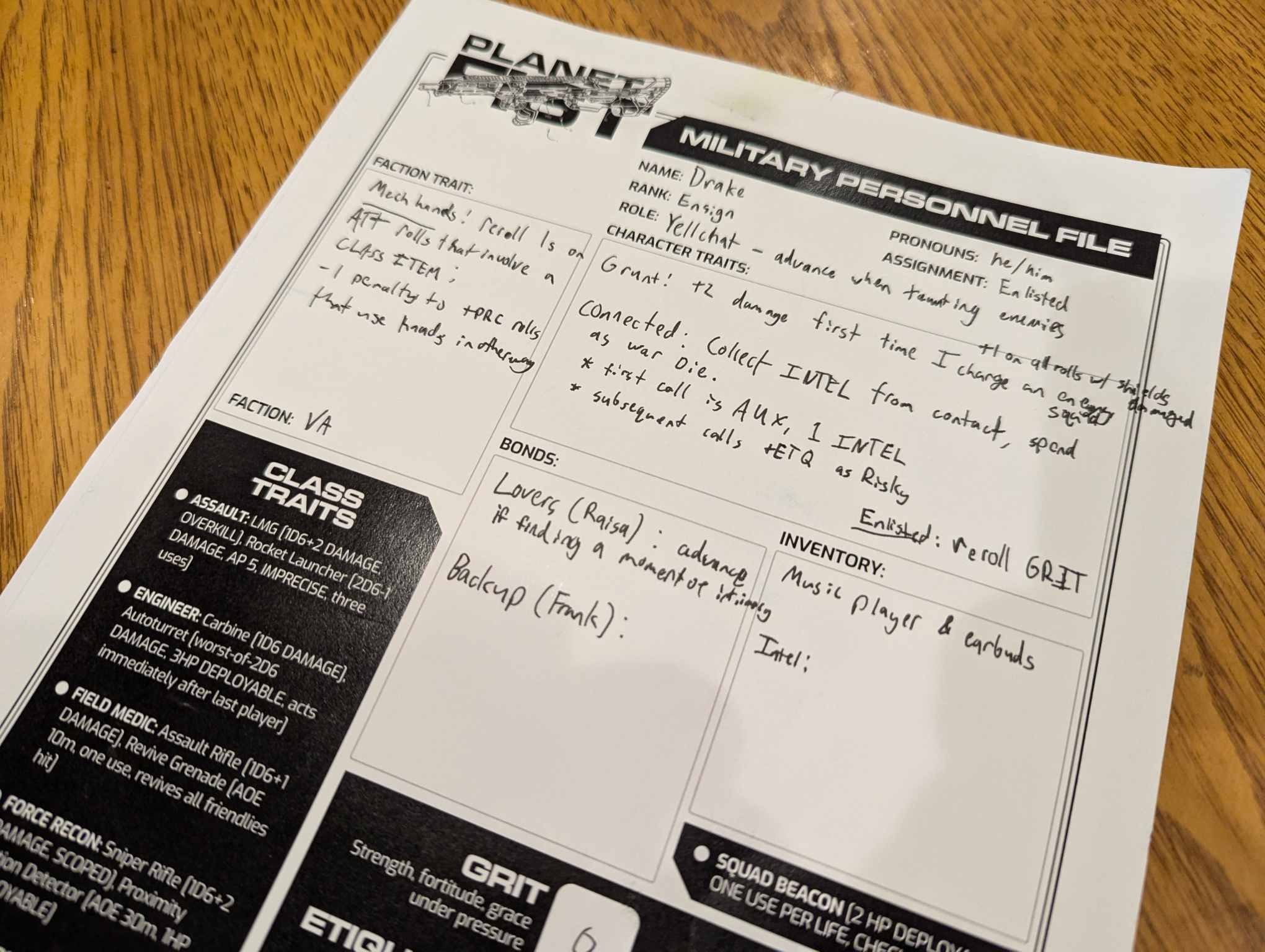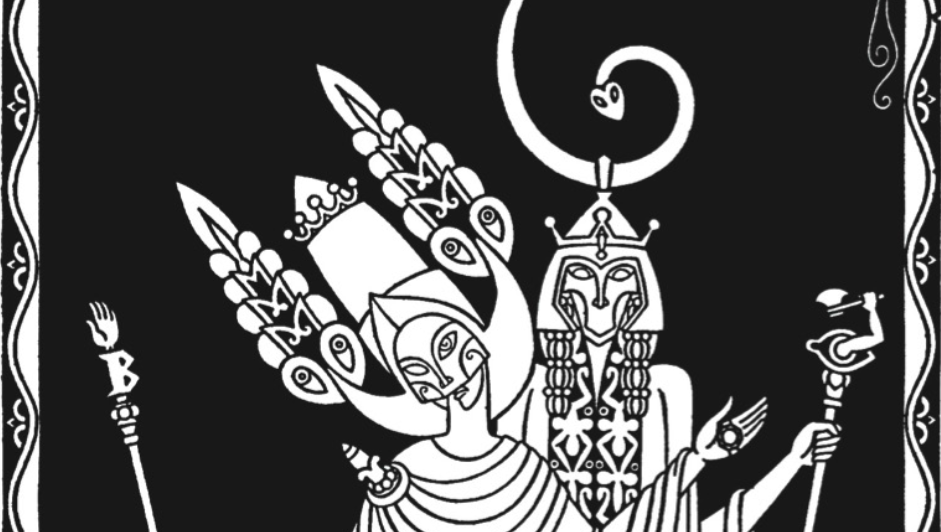
Big Bad Con is the second TTRPG convention I’ve been to ever, and in just about as many months,following my adventures at Gen Con earlier this year. I’m very new to this scene, but I was surprised and delighted to see how different the two were.
The Convention
The most obvious distinction is the scale. Big Bad Con was a couple orders of magnitude smaller in sheer attendance, but it also filled the available space much more comfortably. I didn't find anywhere that actually felt physically crowded. On top of that, masking and COVID safety measures were dramatically stricter and more considered, making the convention inclusive in a way that’s exceedingly rare today.
The event schedule was dense with interesting games and panels, and despite all my days being split in half by volunteering shifts, I still had a ton of interesting options. Sign-ups happened in waves, which made it easier to prioritize a couple of things.
The convention was also full of prolific designers, and it was hard not to be a little starstruck at first. In a strange way, the proximity to so many creators drew out the full force of my social anxiety in a way that I was completely unprepared for, and made the very simple task of “be normal” a bit more difficult for me. I tried to give myself lots of rest in between events to settle my nerves. In the end, though, the events themselves were surprisingly energizing and I was fortunate to have lovely interactions with some designers I respect a great deal (as well as a number of other volunteers and attendees). It’s hard to imagine a much more welcoming space.
The volunteer experience was wonderful. Instructions and communication were clear and contacts for escalation were always on hand. Volunteers were well taken care of, and a break room was made available for resting and grabbing a snack (a nice place to spend a bit of downtime ahead of a shift). I chatted with other volunteers during some of my shifts and brought home lots of nice little nuggets of conversation and game recommendations. I’m excited to go back and hopefully see some of them again.
What I Bought
Regrettably, I had time before the exhibit hall closed to sneak in and buy some things. I apologize for again “the haul”, but I think all of these things are neat and I want an excuse to briefly mention them.

- Sign: A Game about Being Understood — A game designed around the idea of inventing a language, inspired by the true story of a group of deaf children in Nicaragua who built a sign language of their own. It comes from Kathryn Hymes and Hakan Seyalıoğlu of Thorny Games, a design duo who’s work engages deeply with the construction and cultural impact of languages (Dialect, their best-known work, has been on my To-Play list for ages).
- A Collection of Improving Exercises — This is... a solo... drawing game??? I’m not entirely sure what it is, honestly. It’s created by Tim Hutchings, best known for Thousand Year Old Vampire, and involves a framing device with a fictionalized Tim Hutchings as the author. I’ve been dipping my toe into drawing lately but struggling to find resources I like and build the habits. Maybe A Collection of Improving Exercises is a “so crazy it just might work” way to make the practice stick? If not, well, it’s a very pretty book.
- Polaris — I bought a physical copy of this game because it’s so strange and compelling that I signed up to play it at the convention! There were certainly memorable details about the story that we told, but the play experience itself (in and out of character, and along that boundary), was one of the most interesting ones I’ve had in a while. More on that below.
- The Skeletons — A contemplative storytelling game by Jason Morningstar (of Fiasco fame) about the mysterious interiority of the tomb-guarding skeletons on the other side of a classic dungeon crawl. I adore Fiasco, so it felt like it’s long past time for me to read and play more of Jason Morningstar’s work.
- City of Winter — The closest thing to a TTRPG “luxury item” that you’ll catch me buying (I am not often tempted by figures, dice, etc). City of Winter is a game by Ross Cowman, the creator of Fall of Magic (which I wrote about in some depth earlier this year). One of my own design projects takes inspiration from Fall of Magic, particularly the precision and openness of its world-building and its phenomenal prompt writing. City of Winter layers new kinds of complexity and grounds its story with a different time scale (generations), and a different sort of journey (refugees fleeing disaster). I’m not sure when I’ll play City of Winter, but I look forward to it; a little bit because it’s similar to something I love, but primarily because I’m excited to see how it’s different.
- The Conservatory — After I had pledged to purchase no more games (and the dealer hall was well and truly closed up), I chanced to meet Devin Nelson, a friend of a friend who’s also a local TTRPG designer. Our mutual friend had spoken fondly of The Conservatory, a storytelling game about the formation and machinations of a “powerful, esoteric, & occult institution”. I love its setup, and I’m excited to read closer and maybe play it!
What I Played
Much more important than what I bought, of course, is what I did. I played fewer games than I hoped, partly because of volunteer shifts and partly because of spacing things out for self-care’s sake, but each experience was compelling for one reason or another.
PLANET FIST

PLANET FIST is a game about an endless war over a colonized planet between three sci-fi superpowers. Its fiction is driven by a simple narrative flourish: you are playing super-soldiers assembled from nano-machines that dissolve and reassemble when you die, fighting over facilities also assembled from nano-machines that rearchitect themselves when captured by different factions. Your goals generally involve wiping out enemies and capturing these facilities and objectives. You can change your loadout every time you die. All the logic of a multiplayer FPS is diegetically integrated, and even though the resulting storytelling takes on a satirical and maximalist tone, that storytelling is still very present and well-supported.
To that point, PLANET FIST is a narrative game, and in many ways its an ambitious attempt to unify a fiction-first sensibility with the satisfying tactical specificity of wargaming. I'm typically disinterested in tactical wargames, so I joined this one in part with the hope that it could help me appreciate their appeal.
And while it wasn't perfect for me, it did the dang thing! It’s fundamentally a fiction-first game, so it fit my sensibilities in that regard, but it also delivered a level of tactics, resource management, and cleverness that wouldn't typically accompany a fiction-first game. I found the menu of weapon, class, and tactical options to still be a little too dense and fiddly for my personal taste, but that could very much have been a consequence of the time-limited convention setting.
It was great fun to see characters emerge from the sparse but evocative details chosen during character creation (mostly by rolling dice and picking from a couple of options). Even if some of the density of stuff on my sheet didn’t fully hit for me, there really is a coherent union of OSR sensibilities (let’s just roll our characters instead of picking everything!) and fiction-first elements (bolstered by the underlying Powered by the Apocalypse system).
Or to put it in a less jargon-y way: it came across as like a “narrative wargame”, exactly as advertised. Character creation produced compelling cocktails of traits and quirks, and a clever procedure for doling out roles (within the squad) and ranks (within the military organization) established a wonderfully precise and hilarious rapport between characters that spun out into absurd recurring bits. It’s a game with a remarkably focused tone, and the blend of comedic bleakness with video game tropes results an unexpectedly deft satire that remains fun and bombastic.
At the end of the day, I don’t think it’s the first thing I’d reach for to play again, largely because the tactical elements of it still don’t quite speak to me in the same way they do to other folks. However, it is high on the list of games that I would love to run for my home group, some of whom have a video-game-derived affinity for tactics and optimization, and some of whom love to have a tantalizing menu of items and weapons to deploy. It’s not uncommon for me to find a game that I’m excited to run, if I can only find a table who I can pitch on it. But PLANET FIST is a much rarer thing: a game that I’m excited to run unselfishly — a game that I want to run because I think my friends in particular would have an absolute blast playing it.
Polaris

I read Polaris, by P H Lee, a couple of weeks ago after seeing Everest Pipkin’s introspective blog post about it (and about play, planning to play, and solo play experiences; it’s a wonderful piece and you should go read it). Polaris is bizarre, beautiful, and genuinely distinctive despite nearly two decades of games since. It's a bit inscrutable, and some of its most revelatory mechanical ideas have awkward complexities in execution, but it takes an interesting approach to dividing player responsibilities in an attempt to guide them towards a dramatic story. It’s also a hauntingly poetic book, stitched together by key phrases that bind both its structure and its play at the table. As a whole, it feels remarkable and unique and kind of impenetrable.
Polaris provides a sort of mythic setting as the backdrop to your story: a tragic and fragile society crumbling beneath the weight of endless waves of demonic invasions and the frivolous excess of its sheltered survivors. The player characters are knights sworn to defend the last remaining bastions of this civilization, but are doomed to either die in service or fall to their despair and bitterness. This sparse backstory is rendered with intense melodrama and a refreshing disregard for clarity. Today’s most popular RPG settings have enumerated pantheons of gods and planes and such... but we could have settings like that of Polaris, 21 zine-sized pages of myth and poem and no more.
The poetic sensibility is cemented with a series of key phrases that signify the passage between mechanical moments in the game. They open and close scenes and give structure to negotiating conflicts within the story, a ritual and rhythmic element that noticeably affects the feel of play. It's one thing for the book to be filled with phrases like "And so it was that..." or "It was not meant to be". It's another entirely to put them in the players' mouth and form the game around their utterances.
Moreover, these ritual phrases are crucial pieces of the conflict resolution rules, which pit players against each other by aligning them in opposite postures towards the focal characters. Each main character’s story is played out by four players: one who plays the Heart (their own actions), another who plays the Mistaken (their rivals, enemies, and ill fortune), and two more who play people in their periphery. When conflicts arise between the Heart and the Mistaken, a negotiation can take place using the key phrases as mechanisms to extrapolate, retract, or finally resolve a collection of truths that satisfy both players or result in a dramatic dice roll to decide a victor. The phrases build a permission system by which each proposed detail is encapsulated in a unit of negotiation. To look across the table and declare "You ask far too much" or "It shall not come to pass" has a wonderful dramatic weight to it at the table -- even while occurring outside the immediate fiction.
The game is typically played with four players, four characters: each player occupies each role once for the various characters around the table. Instead, we played with five people: four players playing two characters (each person was either a Heart or a Mistaken for one of these two) and a facilitator providing additional ideas, NPCs, and rule clarifications for the conflict interactions. We also started the characters a little further along in their stories, with one of them past the "veteran" tipping point where "Zeal" turns to "Weariness" and character death is on the table.
The story we told was perhaps a little stilted, a little circular, a little fixated on particular setting details to the detriment of others. And we definitely struggled to wrap our heads around the conflict logic at first, even with the helpful flowcharts created by the facilitator (really, he made flowcharts!). But the folks I played with were good fun: thoughtful, committed to their roles, comfortable to give and take up space when moments picked up momentum, and glad to pause and work through rule challenges as they came up.
In the end, the most gratifying part of play was seeing the storytelling and conflict engines tick at a real table. It was also fun to challenge myself, as one of the Hearts, to emphatically fight for my character's success while trusting other players to push back. Like many frequent GMs, I have a tendency to delight in failure and misfortune whenever I'm in the player's seat -- contradicting that impulse was fun and surprisingly difficult, but might come naturally to other kinds of players. The conflict resolution is thorny, confusing, dense… but when it works, it allows each player to truly play their role to the hilt. I just can’t shake the feeling that there is so much more to learn from Polaris.
Interns in the Dark
I get varying mileage out of corporate satire, and while PLANET FIST deployed it by way of heightened sci-fi and video game logic, the portrayal is a bit more straightforward in Interns in the Dark. There were certainly fun moments in the couple hours I spent with it, but the game itself didn’t resonate with me for a number of reasons. I don’t really have much else to say about it, but I greatly appreciated being able to find a shorter 2-hour time slot to squeeze another game into. The typical 4-hour slots are a good sweet spot for completing a story in one go, but some games work fine when run a little quicker than that, and short sessions can be a nice break.

Panels
In addition to playing games, I spent a bit of my time meeting with friends, a good chunk volunteering (this was how I secured my tickets, and the same was true for many other volunteers), and a couple of panels at the end of the day on Sunday.
I hung around for a panel titled The Dark in “Dark Fantasy" - Perspectives of POC in Fiction. The panelists talked about the ways that dark fantasy tropes tend to reinscribe real-world social ills uncritically, and how to avoid these pitfalls while retaining what makes the genre interesting. I wasn’t familiar with the panelists’ work, so I didn’t have a firm foothold with their history with the genre, but I found the discussion to be thought-provoking nonetheless.
The last event I attended was a panel called Designing for Playstyles in GM-less Games, which delved into the challenges of building GM-less games that accommodated and supported a multitude of players and approaches to play. The panelists discussed the way different types of players relate to the lighter structure of gm-less play and the new responsibilities it often entails, and gave voice to man of the challenges I've seen both facilitating and designing this format of game. It was immensely insightful and I could have listened to several hours more of discussion.
Next Year
I implied at the end of my Gen Con post that I’d like to go back, and maybe even run some convention games myself. But with Big Bad Con I feel much more strongly: I will be going back if possible, hopefully with friends in tow, and I’m excited to get even more out of my time there next year.
A few goals for next time:
- I want to check out the Games on Demand hall next time, where games are offered and filled over the course of the day rather than through a pre-scheduled portal. I kept missing the windows, but next time I hope it lines up.
- I’d like to do is play a LARP (some of which I heard a lot of folks talking about and enjoying). It’s a step towards the theatrical and improvisational side of the hobby that’s generally intimidated me to this point, but I’m hoping to give it a shot next time.
- I also hope to have a pocket game to play with friends I meet, or to play some pickup games with discord communities that I’m only just getting to know. Hopefully I’ll be in the loop next time!
I think that’s probably enough conventions for me for this year. But I'm glad of how much I've learned and experienced, and how much more there is to explore in future years.